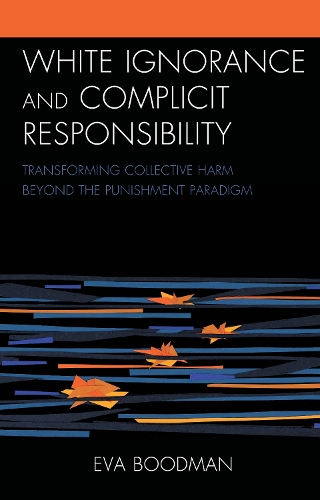
White Ignorance and Complicit Responsibility: Transforming Collective Harm beyond the Punishment Paradigm
(Hardback)
Publishing Details
White Ignorance and Complicit Responsibility: Transforming Collective Harm beyond the Punishment Paradigm
By (Author) Eva Boodman
Bloomsbury Publishing PLC
Lexington Books
10th January 2022
United States
Classifications
Professional and Scholarly
Non Fiction
Central / national / federal government policies
Society and culture: general
Social theory
305.809
Physical Properties
Hardback
168
Width 161mm, Height 228mm, Spine 19mm
431g
Description
White ignorance is a form of collective denial that aggressively resists acknowledging the role of race and racism. It dominates our political landscape, warps white moral frameworks and affective responses, intervenes in white self-conceptions, and organizes white identities. In this way, white ignorance poses a problem for conceptions of responsibility that rely on individuals intentions, causal contributions, or knowledge of the facts. As Eva Boodman shows, our moral concepts for responding to racism are implicated in the process of racialization when they understand responsibility as the attribution of blame or absolution, innocence or guilt. White Ignorance and Complicit Responsibility challenges these binary, punitive moralities, arguing that they reproduce racial harm by encouraging white people to seek innocence and the purification of moral taint instead of addressing the material conditions of racial harm. Instead, Boodman claims the space of complicity as a place of anti-racist possibility. Linking the construction of whiteness to a racist punishment paradigm, this book makes the case for a different way of responding to harm as necessary for dismantling the moral, racial, political, and affective constructs that keep racial capitalism in place.
Reviews
"Eva Boodman has written a much-needed book for our times and for the times to come so long as we continue to sustain a polity of white supremacy. This book is a major contribution to social epistemology, critical race theory, and whiteness studies. At its core is the thesis that race, epistemic practices, and ethical norms are entangled in the very fabric of our political institutions. Knowing and not knowing are not isolated events in the Cartesian theater of loneliness, but social-political-economic practices of social agents, of the Beauvorian, Sartrean, Millsian, Baldwinian, Alcoffian, and Westian type. We are as much what we know and aspire to know, as what we do not know, and refuse to know."
-- Eduardo Mendieta, Pennsylvania State UniversityAuthor Bio
Eva Boodman is assistant professor of philosophy at Rowan University.
